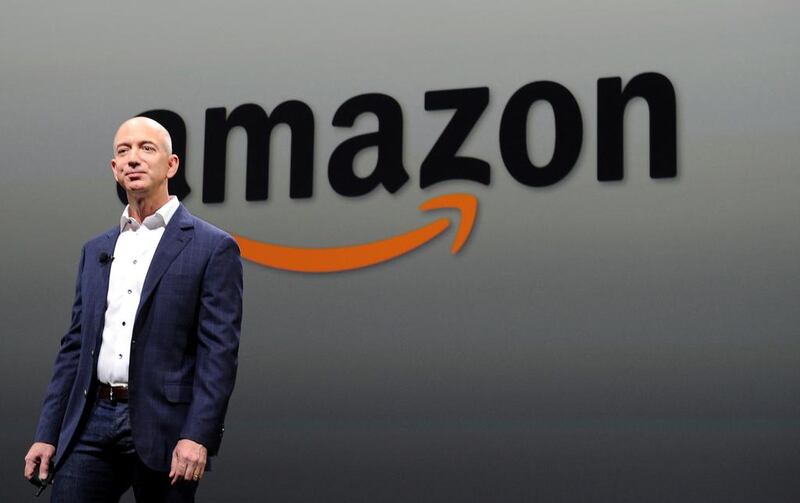Banks around the world have spent the past few years preparing for competition from small, nimble technology startups. It turns out the real threat may be Jeff Bezos.
Financial institutions have parried the threat from fintech firms by incorporating some of their innovations through partnerships and in-house coding teams, according to McKinsey & Co.
In its annual banking report, McKinsey said that the industry needs to continue its digital makeover to protect the up to 40 per cent of revenues at risk by 2025 and prepare for competition from so-called platform companies like Mr Bezos’s Amazon.com.
“We thought that fintechs would provide the chief digital threat,” authors of the report said. Instead, it’s become clear that e-commerce companies such as Amazon and Alibaba Group Holding “are reshaping one industry after another, blurring sector boundaries as they seek to be all things to all people.”
Mr Bezos, the founder and chief executive of Amazon, built the company into the world’s biggest online retailer. As he extends Amazon’s reach, the Seattle-based company has had discussions with banking regulators about financial innovation, according to lobbying disclosures reviewed by American Banker. And it already has a small-business lending arm that has doled out more than $3 billion to more than 20,000 of the merchants on its e-commerce platform.
American technology giants including Alphabet’s Google and Facebook have already begun to encroach on finance activities like payments, McKinsey said, and concern is spreading through the boardrooms of traditional lenders.
Barclays chief executive Jes Staley said at a conference this month banks need to defend their turf and predicted payments will become "where the battleground of finance is fought over the next 15 years."
_________
Read more:
Apple Pay to boost UAE's e-payments market even as cash remains king
Now Money: a fintech start-up servicing the UAE's low-income migrant population
Fintech service companies challenge modern banking systems
_________
In Asia, firms like Alibaba have made the most headway. Digital upstarts in China have grabbed huge chunks of market share from banks, including 25 per cent of unsecured consumer lending and 12 per cent of mutual fund sales.
“You have companies that have hundreds of millions of customers, offer a great customer experience and trade at a currency that rewards revenue, but not necessarily profit growth,” Asheet Mehta, one of the authors of the McKinsey report, said. “They are under pressure to keep increasing revenue, and financial services is a large pool they can go after. We’re starting to see that.”
Here in the UAE, fintech is still an emerging sector in a country where cash still remains king. According to Suvo Sarkar, senior executive vice president at Emirates NBD, over 80 per cent of all transactions, especially with personal payments or payments with smaller merchants, are made in cash.
However with the launch of Apple Pay on Tuesday, a new digital platform that “transforms mobile payments with an easy, secure and private way to pay” according to Apple, and Samsung Pay in April, contactless and e-payments services are on the rise.
Fintech initiatives such as Now Money, a platform that uses banking technology to provide accounts and remittance options for those that do not have access to traditional bank accounts, and Emirates Digital Wallet, which recently launched a mobile payments service for low-income workers are also helping the lower-income segments of society have access to digital payment options, which can be safer and more transparent.
"In our view, this whole region is ripe for financial transformation and that's where fintech comes into play," Richard Teng, the chief executive of Abu Dhabi Global Market's Financial Services Regulatory Authority, told the National earlier this month.
In McKinsey’s vision for the future, tech companies will reorder global commerce into ecosystems in which giants provide a variety of products and services through a single gateway. Banks will still have opportunities in this new order because they are trusted by customers and hold vast data sets about retail and corporate transactions, according to the consulting firm.
The global banking industry, which had an 8.6 per cent return on equity last year, could offset the loss of profits from price competition by partnering with platform companies and generating more revenue from their data. Banks that go further by creating their own platforms could elevate their ROE to 14 percent, according to the report. ROE is a measure of profitability.
In the UAE, for example, several banks including Emirates NBD and Mashreq have implemented their own contactless and e-payments services.
Bankers in Asia and parts of Europe and Latin America are much more worried than their counterparts in the US, Mr Mehta said. While American bank executives often cite heavy regulation as a barrier to entry against technology firms, the position of regulators could evolve to create a more level playing field, according to the report.
Even without that, as technology giants build out their consumer ecosystems in the US, they could offer things like cross-border transactions and payroll services through established providers, Mr Mehta said.
“There’s no reason they can’t offer deposits,” he added. “They could have bank providers in their mall, like they do with lots of other merchants. If anybody wanted to not have a bank charter, that is one way you would do it.”







